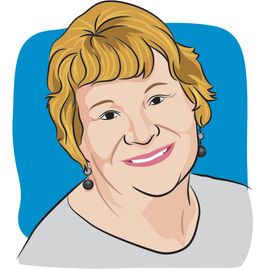- About Us
- Advertise / Support
- Editorial Board
- Contact Us
- CancerNetwork.com
- TargetedOnc.com
- OncLive.com
- OncNursingNews.com
- Terms & Conditions
- Privacy
- Do Not Sell My Information
- Washington My Health My Data
© 2025 MJH Life Sciences™ and CURE - Oncology & Cancer News for Patients & Caregivers. All rights reserved.
What Do People With Cancer and Bumblebees Have in Common?

Jane Biehl is a 12-year survivor of a very rare form of blood cancer, known as myelodysplastic syndrome (MDS). She has enjoyed several exciting careers including a librarian, counselor, teacher, and writer. She loves to write about surviving cancer, overcoming hearing loss and the wonderful benefits of having a hearing-ear service dog.
Cancer survivors are like bumblebees in that they continue to go on and fly despite the countless obstacles they face.
During my long 10-year cancer journey I have had the pleasure of meeting many cancer survivors. Honestly, this is one of the few plusses from having this insidious disease. I have watched people survive unbelievable assaults on their bodies ranging from surgeries, to radiation, to chemo, to bone marrow transplants.
Somehow, they keep on going, putting one foot in front of the other and spend a lot of time (which they know is precious) reaching out and helping others. I also go weekly to the infusion floor for shots at the cancer center. Some patients are obviously very ill, but still manage a cheery greeting to the nurses and me.
I wonder how they do it. Then, I remember a favorite professor in my rehabilitation counseling classes for my master’s degree. She taught a favorite class called “Psychosocial Aspects of Disability.” I learned an incredible amount about working with people with disabilities.
The first lesson she taught us involved four simple words: DO NOT PITY THEM. She explained the difference between empathy and sympathy. She instilled in us we were not training as counselors to “help” people, but to teach them how to help themselves.
After I graduated and worked in a vocational agency for people with disabilities, I would tell my clients that this was like a baseball game. My agency would provide them with the tools to succeed like training, job coaches, special computer equipment and devices. But it was up to them to hit a home run or strikeout and try again. Landing and keeping the job was up to them.
Another thing I remember this wise professor teaching us was that people with disabilities (or cancer) are like a bumblebee. There is no scientific way a bumblebee should be able to fly, but it does. And no one understands how.
Aerodynamically a bumblebee should not be able to fly, but it doesn’t know this, so it keeps on flying anyway. A.S. Waldrop has written an amazing poem, “The Bumblebee Cannot Fly,” on this topic.
- According to laws of aerodynamics
The bumblebee cannot fly;
Its body is too heavy for its wings
and that’s the simple reason why.
But the bumblebee doesn’t know this fact,
And so, it flies anyway for all to see.
Remember this when you're
losing faith or hope God’s proof that the
impossible can be.
When I read this poem, I think of all the people I have been privileged to know with disabilities and cancer. Today, many people are coping with COVID-19 and terrible losses. And yet, they somehow manage to go on and fly. They may not know how, but they do. I appreciate all the people I worked with who had horrible disabilities, and all the people with cancer I have met who are true survivors.
Thank you all for teaching the rest of us to fly!
Related Content:



